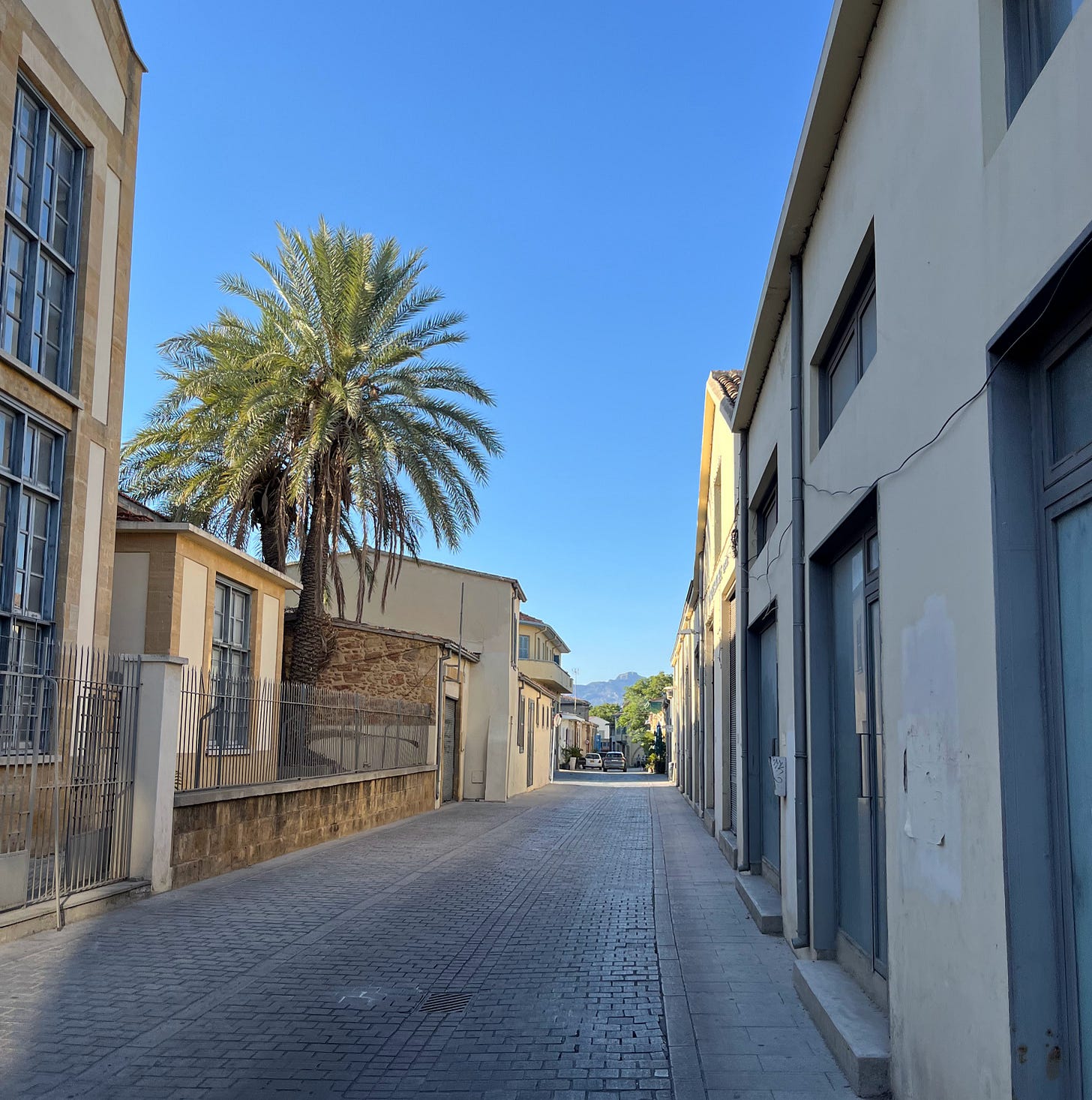“When, after passing a pleasant range of hills, Levkosia first bursts upon the sight, with her slender palms and minarets, seated in a desert plain, a chain of picturesque mountains as the background, it is like a dream of the Arabian Nights realised—a bouquet of orange gardens and palm trees in a country without verdure, an oasis encircled with walls framed by human hands.”
–Archduke Louis Salvator of Austria, 1881
On a June afternoon, a Lufthansa Airbus descended over the airport of Larnaca, Cyprus. The barren hills and hardy shrubs of the island appeared first, simmering in the summer light, then as the plane turned, the aircraft cruised over the wine-dark sea before touching down on the heated concrete.
The airport was the same—gleaming with a nouveau-brutalist sheen—but, according to a Cypriot friend with knowledge of the situation, the landing pattern was different, a redirection thanks to the Israel-Hamas War, so as to avoid exposing allied warships that have since habitually anchored off the Cypriot coast.
I left Cyprus two years ago. Some things, thanks to the many developments in the region, had changed. Aside from the conflict, it was certainly hotter, with temperatures routinely cresting 40 ºC (104 ºF), plus humidity.
But many other aspects, the good and the bad, remained. The island remained peaceful, and in many ways, prosperous. And yet the island remained divided, with no solution in sight.
When I departed Cyprus in 2022 after almost a year on the island, I felt a little bit fatalistic. Here I had spent many months building a network and a relationship with a community, and in the last three months I had slowly, brick-by-brick, dismantled the life I’d built.
I remembered the day I left vividly. It was cloudy that morning, when I walked to the taxi waiting outside, the weighty luggage of a year abroad trailing behind—so weighty that one of my luggage wheels had broken the week before. And as I watched the city speed by and its white-toned sprawl recede into the distance, my year there felt like some kind of dream, fading into the fog.
So, after all this time, I wondered, what it would be like to return?
Jet-lagged and sweaty with the patina of intercontinental travel, as I drove my rental Hertz Ford Fiesta back to the Old City of Nicosia (on the left side of the road, no less), I marveled at the barren countryside as it rushed past, the billboards for Starbucks and curiously novel systems for transferring assets (Flyfish, anyone?), and finally I headed into the lurching Nicosia traffic, which now seemed tame compared to my present-day driving reality in Los Angeles.
And as I steered through the Venetian battlements of Nicosia, the old city loomed ahead like a senescent creature, its haphazard alleys filled with the mystery of time and the romance of date palms, mosques and churches intermingled in the village squares—and then and only then did I realize what it meant to be back.
Because it wasn’t necessarily the familiar places that mattered to me—the monuments, the walkways, the slow cafés—nor the inevitably Orientalized perceptions that a Westerner must recognize and shake off in him or herself—it was the many faces and figures of the city that I had bonded with. And over the course of my two weeks on the island, I met again with many of the people I’d encountered before. Here, unlike the brisk 30 minutes afforded to a coffee meeting in California, one café date might stretch for hours; if you weren’t careful, a conversation might last weeks.
And though the sun and the sea, the humble-yet-elevated cuisine, were aspects that drew me to the Mediterranean in the first place, it was the warmth of these interactions that have led me to come back to this part of the world, again and again.
And so my work on Cyprus remains unfinished. Here’s a taste of it:
The burgeoning city of Limassol has a new mayor—and he’s an architect. (See my interview with now-mayor Giannis Armeftis in a previous article in the newsletter). I’ll be following this story keenly as Armeftis’ career continues.
The Usonian’s “Famagusta Collage” will be completed with Parts IV and V in the next two months—finally. I’d been waiting for another piece on a related subject to come out, but as that piece has become interminably delayed, it’s time to move forward and complete this miniseries.
A few more projects, either in the works for a long time, or just emerging, are on the way.
In the meantime, we can look back at a publication that is just now getting a second-life…
TRIO, relaunched
In 2022, I—along with two other Americans, janan alexandra and Caroline Sager—published a small art book with Phaneromenis70, a local press in Nicosia. This summer, the Cyprus-themed book has been reprinted. TRIO features janan’s poetry, Caroline’s photographs, and my short story “Silent G,” about the abandoned ghost town of Varosha. That story is presented in both English and in Greek.
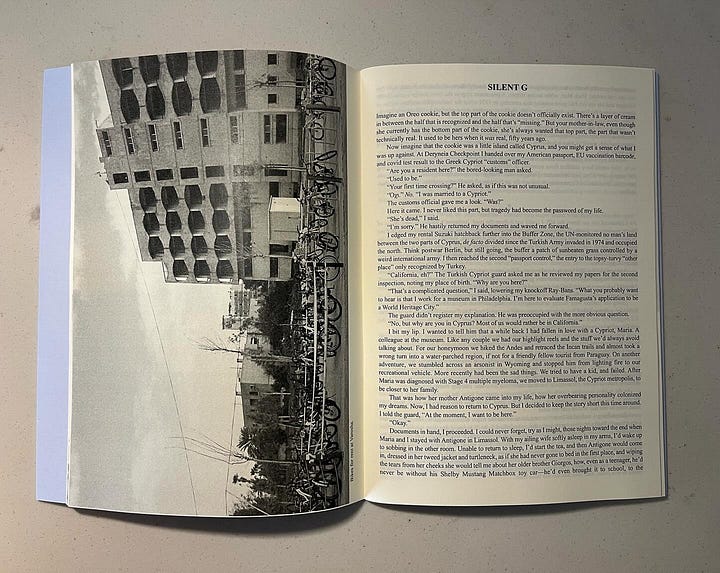
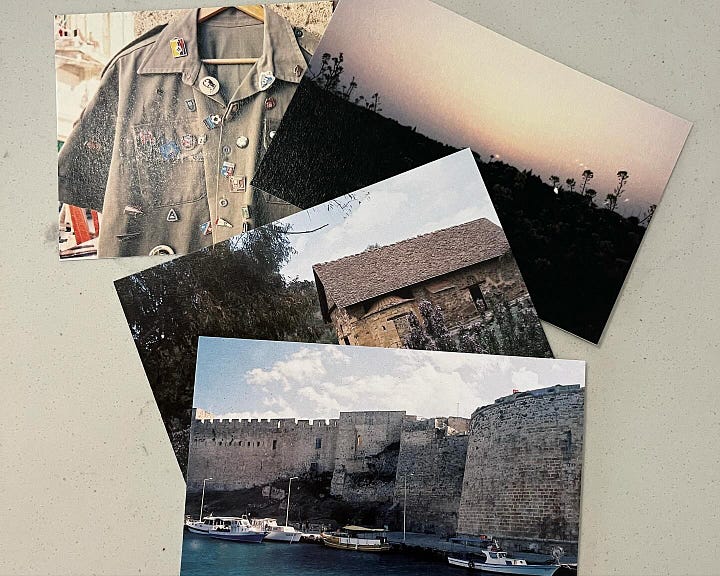
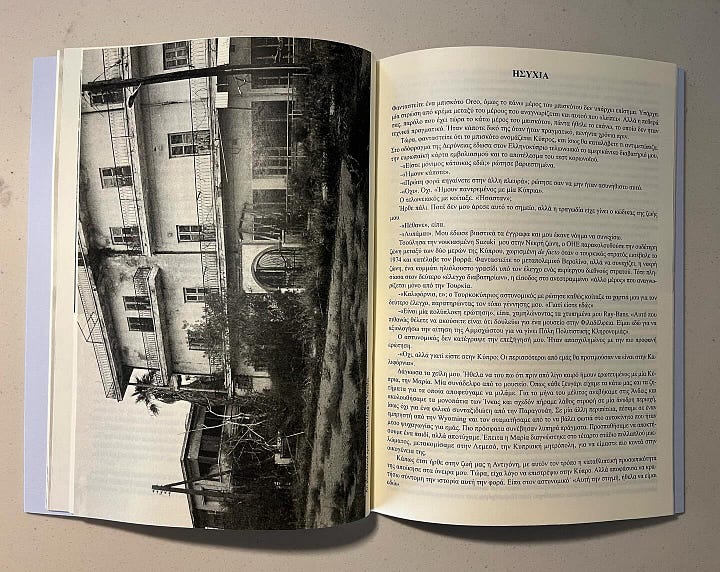
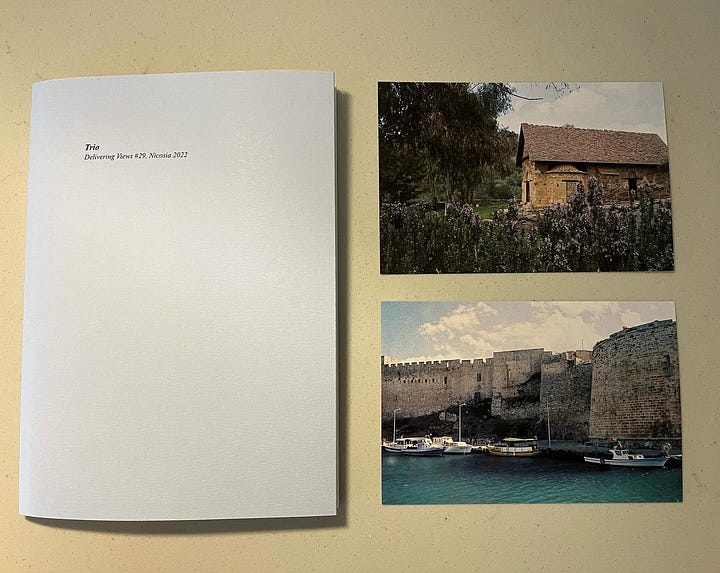
If you’re in Cyprus or elsewhere in Europe and you’re interested in picking up a copy, it’s probably easiest to buy the book from Phaneromenis70, by ordering online or walking into the Old City Nicosia shop, in Phaneromenis Square.
As it happens, I brought home a bunch of copies of the second edition of Trio. So if you’re stateside and you’d like to order a copy directly from me, please reply to this newsletter email (or send me a message at hb.batonentertainment[at]gmail.com) and we can arrange order details.
I’m charging $20 for the book, or $25 for the book + postcard pack, plus shipping and handling (~$5.23 for domestic shipments). I’m also happy to sign the book and leave a small message, gratis.
So if you’ve yet to see our incredible glimpse at the island of Aphrodite, please order soon—supplies are limited. I’d love to share this work with more readers.
Departure
In July, as I once again prepared to depart the island, I felt a sense of renewal. The year I had previously spent on the island was life-changing. In my two-week return, my past life in Cyprus was affirmed. It was not a dream, but an investment in a lasting relationship.
The island and its people would be here, continuing. And on occasion, I’d be permitted to briefly enter the rarified world that I’d once inhabited, and be part of it once again.




